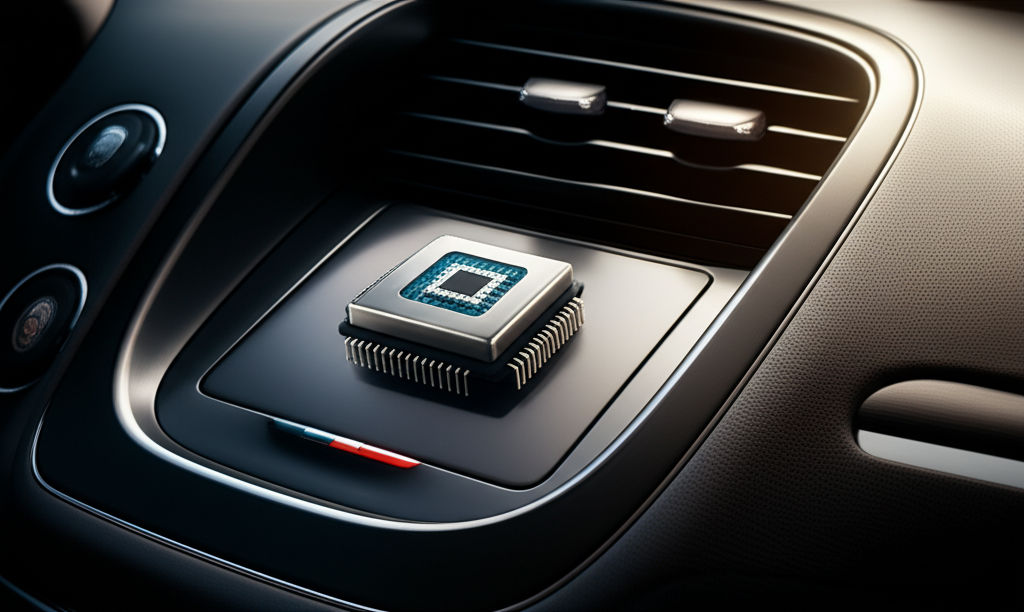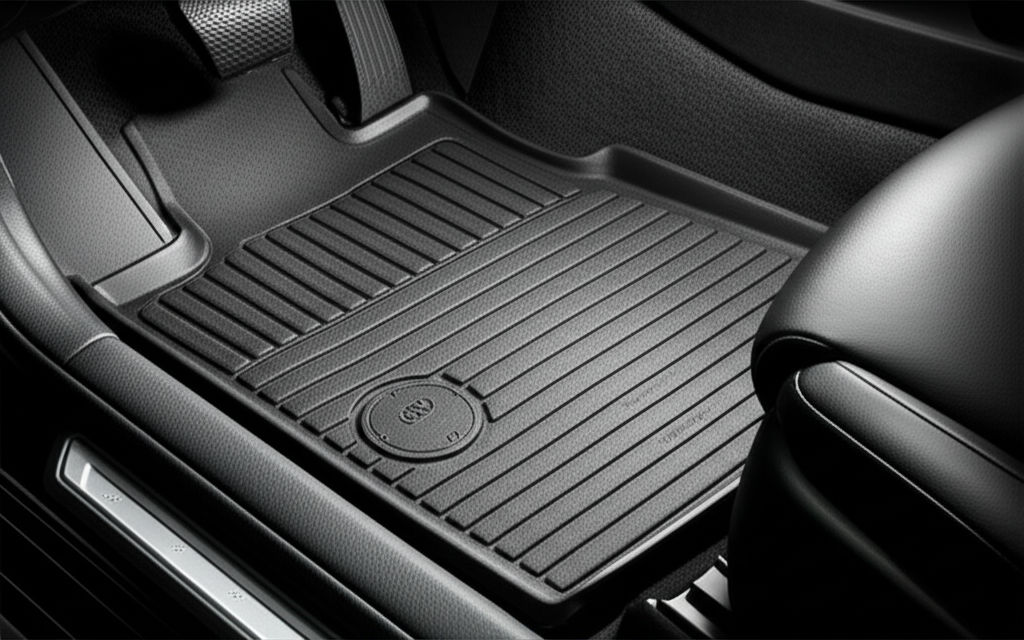How Automotive Gyroscope Technology Works Today
Ellie Moore

Photo: Explore how automotive gyroscopes are your car's unseen guardian, boosting safety, stability & enabling autonomous driving.
The Unseen Guardian: How Automotive Gyroscope Technology Works Today
Imagine driving down a winding road, feeling perfectly in control as your car effortlessly navigates each curve. Or perhaps you're merging onto a busy highway, and your vehicle smoothly adjusts its speed and position. What if a sudden patch of ice or an unexpected obstacle throws your car off balance? In these moments, an invisible guardian is at work, constantly monitoring and correcting your vehicle's movements: the automotive gyroscope.
Once confined to aircraft and sophisticated navigation systems, gyroscopes have become fundamental components in modern vehicles, playing a crucial role in safety, stability, and even the future of autonomous driving. But how exactly do these miniature marvels work, and what do they do for your daily commute? Let's take a deep dive into the fascinating world of automotive gyroscope technology.
What is a Gyroscope? The Basics of Rotational Sensing
At its core, a gyroscope is a device that measures or maintains orientation and angular velocity. Think of a spinning top: once it's set in motion, it resists changes to its axis of rotation, maintaining its upright position. This principle, known as the conservation of angular momentum, is the fundamental concept behind how traditional mechanical gyroscopes work.
However, the gyroscopes found in today's cars are far from the bulky, spinning tops of old. Modern automotive gyroscopes are typically tiny, robust, and incredibly precise sensors, predominantly utilizing Micro-Electro-Mechanical Systems (MEMS) technology.
The Evolution of Gyroscopes in Cars
While mechanical gyroscopes have been around for centuries, their integration into automobiles is a relatively recent development, made possible by advancements in miniaturization and manufacturing. Early attempts at automotive navigation, like Honda's "Electro Gyrocator" in 1981, used a helium gas gyroscope to detect rotation and movement, offering a rudimentary form of inertial navigation before GPS was widely available.
The real revolution began with the widespread adoption of MEMS technology. These tiny silicon-based sensors could be mass-produced at a low cost, making them viable for integration into consumer vehicles. This paved the way for advanced safety features that have become standard in almost every new car today.
How Automotive Gyroscopes Work: The Core Mechanics
Modern automotive gyroscopes, primarily MEMS gyros, operate on the principle of the Coriolis effect. Instead of a large spinning wheel, these sensors contain a tiny, vibrating mass.
Micro-Electro-Mechanical Systems (MEMS) Explained
MEMS technology involves creating microscopic mechanical and electrical components on a silicon chip. For a gyroscope, this typically means a silicon mass suspended by flexible beams. This mass is set into a continuous vibration, often like a tiny tuning fork.
Detecting Angular Velocity Through Coriolis Force
Here's where the magic happens:
- Driving Motion: The MEMS gyroscope has a "drive axis" along which its internal mass is continuously vibrated at a specific resonant frequency.
- Rotation and Coriolis Force: When the car (and thus the gyroscope) rotates around an axis perpendicular to the drive axis, the vibrating mass experiences an apparent force known as the Coriolis force. This force acts perpendicular to both the direction of the mass's vibration and the axis of rotation.
- Sensing Motion: The Coriolis force causes the vibrating mass to deflect or move along a "sense axis," which is orthogonal to the drive axis.
- Electrical Signal: This minuscule deflection causes a change in capacitance between comb-like structures on the sensor, which is then measured electrically. The change in capacitance is directly proportional to the angular velocity (how fast the car is turning or rotating) around that specific axis.
Automotive gyroscopes are typically designed to measure rotation around one or more orthogonal axes: pitch (forward/backward tilt), roll (side-to-side tilt), and yaw (rotation around the vertical axis, like when turning). The yaw rate sensor, in particular, is crucial for detecting side-to-side movement or skidding.
Key Applications of Gyroscope Technology in Modern Vehicles
The data provided by automotive gyroscopes is indispensable for a wide array of vehicle systems, constantly feeding information to the car's central computer to ensure safety, stability, and precision.
Electronic Stability Control (ESC) / Electronic Stability Program (ESP)
This is arguably the most critical application of gyroscope technology in cars. ESC systems, which became standard in many countries, use gyroscopes (often alongside accelerometers and wheel speed sensors) to detect when a vehicle is losing traction or deviating from the driver's intended path.
- How it works: The gyroscope measures the vehicle's yaw rate (how much the car is rotating around its vertical axis) and compares it to what the system expects based on steering wheel input and wheel speeds. If there's a discrepancy—for example, if the car starts to skid or understeer/oversteer—the ESC system springs into action.
- Corrective Action: The system can then selectively apply brakes to individual wheels and/or reduce engine power to help the driver regain control and bring the car back on its intended course. This happens in milliseconds, often before the driver even fully realizes a loss of control is occurring.
Roll Stability Control (RSC)
Especially vital for vehicles with a higher center of gravity like SUVs, RSC systems utilize gyroscopic sensors and accelerometers to detect excessive tilt or lateral movement that could lead to a rollover.
- How it works: Gyroscopic sensors continuously monitor the vehicle's roll angle. If the system detects a high risk of rollover, it will intervene by selectively applying brakes to individual wheels and reducing engine power to stabilize the vehicle. This helps to keep the car upright during sharp turns or sudden maneuvers.
Advanced Driver-Assistance Systems (ADAS)
Gyroscopes are foundational to many ADAS features, which enhance safety and convenience, and are a stepping stone towards autonomous driving.
- Lane Keeping Assist: By precisely measuring the vehicle's angular motion and orientation, gyroscopes help these systems understand the car's position relative to lane markings and make subtle steering adjustments to keep the vehicle centered.
- Autonomous Driving: For self-driving cars, high-performance gyroscopes provide critical data on the vehicle's orientation and angular velocity, improving the accuracy and reliability of the autonomous driving system. They are part of the Inertial Measurement Units (IMUs) that combine data from accelerometers and gyroscopes to provide comprehensive motion data for precise tracking.
Navigation Systems
While GPS provides absolute positioning, gyroscopes enhance navigation by offering "dead reckoning" capabilities.
- GPS Augmentation: In areas where GPS signals are weak or lost (like tunnels or urban canyons), the gyroscope, along with odometers and accelerometers, can continue to track the vehicle's movement, estimating its position and direction until the GPS signal is reacquired. This ensures continuous and accurate navigation information.
Suspension Systems
Some advanced active suspension systems utilize gyroscopic sensors to monitor vehicle body roll and yaw movements in real-time.
- Active Roll Bars/Suspension: By integrating gyroscope data, these systems can instantaneously adjust suspension components (like damping or stiffness) to counteract forces that cause body roll during cornering, improving stability and comfort. This helps maintain optimal tire contact with the road, enhancing both handling and ride quality.
The Benefits of Gyroscopes in Your Car
The integration of gyroscope technology has brought about significant improvements in the automotive experience:
- Enhanced Safety: This is the most profound benefit. Systems like ESC and RSC, heavily reliant on gyroscopes, have demonstrably reduced accidents and fatalities by helping drivers maintain control in critical situations. They can prevent skidding, spinning, and rollovers, significantly increasing occupant safety.
- Improved Driving Dynamics: Gyroscopes contribute to a more stable and predictable ride, especially during cornering and sudden maneuvers. This translates to better handling and a more confident driving experience.
- Greater Comfort: In active suspension systems, gyroscopes help smooth out the ride by minimizing body roll and pitch, leading to a more comfortable journey for passengers.
- Foundation for Future Mobility: As vehicles become more automated, the precision and reliability of gyroscopes will be increasingly vital for safe and accurate autonomous navigation and control.
The Future of Automotive Gyroscope Technology
The journey of automotive gyroscopes is far from over. Continuous innovation is pushing the boundaries of their performance and integration:
- Miniaturization and Cost Reduction: MEMS gyroscopes are already tiny and cost-effective, but research continues to make them even smaller and more affordable while improving accuracy. This allows for their deployment in even more vehicle systems.
- Increased Accuracy and Reliability: For autonomous driving, gyroscopes need even higher performance specifications than those currently used in consumer electronics. Researchers are working on developing gyroscopes that can detect minute rotational movements even in challenging environments with strong vibrations.
- Sensor Fusion and AI Integration: The future
Finance & Investment
View All
February 27, 2025
Personal Finance for BeginnersUnlock online success with expert SEO content. Learn how E-E-A-T-driven content builds trust, boosts rankings, and drives conversions. Actionable guide inside!
Ellie Moore

November 3, 2025
Beginner Guide to Automotive FinanceElevate your content! Discover what expert SEO content is, why it's vital, and how to create it for higher rankings and engaged readers.
Ellie Moore

June 17, 2025
MS in Finance What You Need to KnowUnlock higher rankings & engaged audiences with expert SEO content. Learn to create valuable, E-E-A-T-driven content that satisfies search engines & users.
Ellie Moore

June 16, 2025
Machine Learning Applications in FinanceElevate your online presence with expert SEO content. Learn how E-E-A-T drives top rankings, builds trust, and delivers genuine value to your audience.
Ellie Moore

April 2, 2025
El Financ Global Finance SimplifiedMaster expert SEO content to boost rankings, attract organic traffic, and build authority. Your guide to online success starts here.
Ellie Moore

October 5, 2025
Bajaj Finance Share Market UpdateMaster expert SEO content to build online authority, drive organic traffic, and establish your brand as a trusted leader. Go beyond keywords!
Ellie Moore
Insurance
View AllSecure your business's future. Explore Premium Erie Insurance Coverage to mitigate risks, ensure financial stability, and optimize your risk management strategy...
Ellie Moore
Get comprehensive protection with Essential Foremost Insurance Plans. Our guide helps policyholders, agents & risk managers navigate specialized coverage & secu...
Ellie Moore
Protect your future with Premium State Farm Insurance. Explore comprehensive plans for personal & commercial risks, ensuring financial stability and peace of mi...
Ellie Moore
Climate change impacts are rising—learn how climate risk insurance offers protection against extreme weather and environmental losses.
Ellie Moore
Don't leave assets vulnerable! Premium Shelter Insurance offers unparalleled protection, comprehensive coverage, and financial stability for policyholders & ris...
Ellie Moore
Maximize your car accident claim! Discover why top-rated lawyers are essential for navigating complex insurance, securing optimal compensation & justice.
Ellie Moore
Education
View AllProject-based learning engages students by tackling real-world problems. Learn how this approach fosters critical thinking and creativity.
Read MoreRevive ancient teaching with the Socratic method! Learn how this questioning approach encourages deep thinking and active learning.
Read MoreLearn key strategies for creating inclusive classrooms. Discover how to foster equality, engagement, and a sense of belonging for every student.
Read MoreOutdoor learning promotes cognitive and social growth. Explore how nature-based education enhances learning outcomes and student well-being.
Read MoreStrong school-community partnerships can drive student success. Discover the benefits and strategies for effective collaboration.
Read MoreMultilingual education promotes diversity and cultural understanding. Learn why it matters and how it benefits students in a globalized world.
Read MorePopular Post 🔥
View All
1
2
3
4
5
6
7
8
9
10
Health






Automotive
View All
January 31, 2025
How Self-Driving Cars Are Redefining Daily Commutes
Explore how autonomous vehicles are revolutionizing the way we commute. Learn about tech advances and future trends. Ready to ride the future?

July 29, 2025
All Automotive Essentials For Your Car Maintenance
Master car maintenance with our ultimate guide! Learn essential DIY tips, tools & fluids to boost safety, extend lifespan & save money.

February 5, 2025
Must-Have Tools for Every DIY Mechanic
Are you a DIY mechanic? Equip yourself with these essential tools for hassle-free car repairs and maintenance. See what every toolbox needs!

August 12, 2025
STS Automotive Denver Services You Can Trust
Searching for trusted used cars in Denver? STS Automotive specializes in affordable vehicles, including salvage titles, ensuring value & peace of mind.

September 4, 2025
Automotive Rubber Matting For All Weather Use
Protect your car's interior from mud, spills & wear with all-weather rubber mats. Preserve value & enhance hygiene. Get your ultimate guide!

August 22, 2025
Dannys Automotive Fast Reliable Service
Danny's Automotive offers fast, reliable service. Get expert vehicle care combining speed with precision and trust, without compromising your schedule.

















